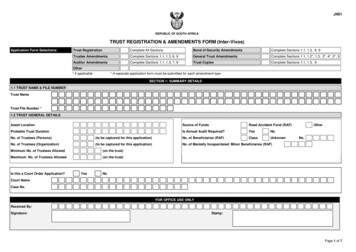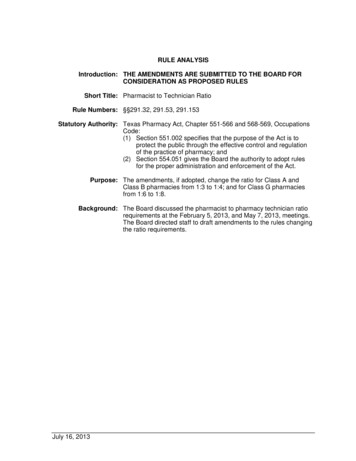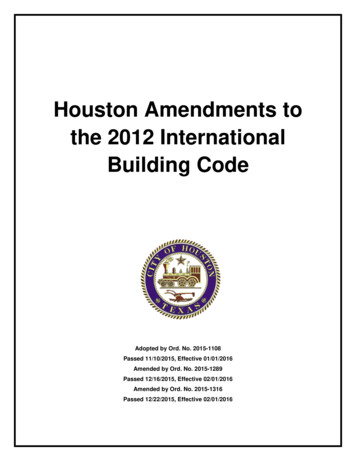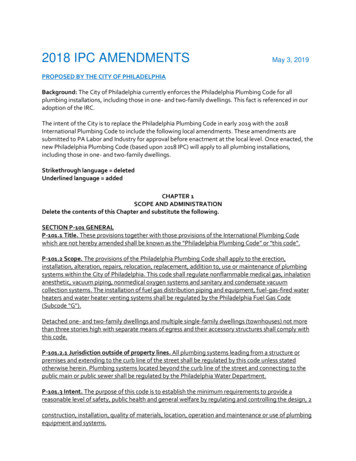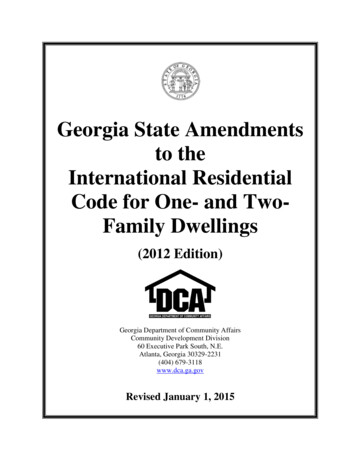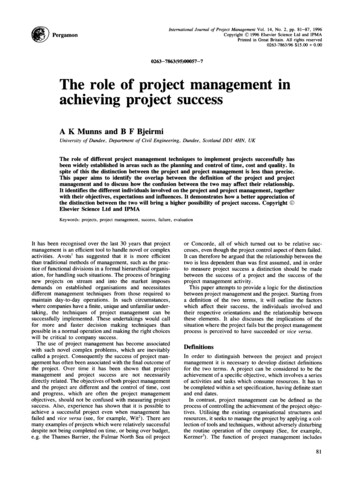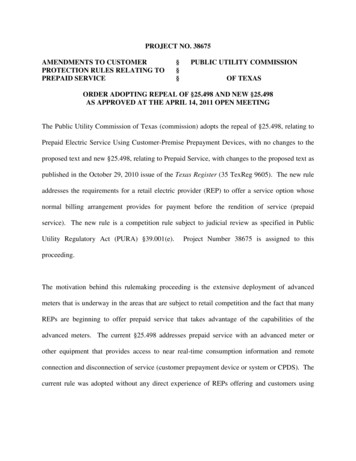
Transcription
PROJECT NO. 38675AMENDMENTS TO CUSTOMERPROTECTION RULES RELATING TOPREPAID SERVICE§§§PUBLIC UTILITY COMMISSIONOF TEXASORDER ADOPTING REPEAL OF §25.498 AND NEW §25.498AS APPROVED AT THE APRIL 14, 2011 OPEN MEETINGThe Public Utility Commission of Texas (commission) adopts the repeal of §25.498, relating toPrepaid Electric Service Using Customer-Premise Prepayment Devices, with no changes to theproposed text and new §25.498, relating to Prepaid Service, with changes to the proposed text aspublished in the October 29, 2010 issue of the Texas Register (35 TexReg 9605). The new ruleaddresses the requirements for a retail electric provider (REP) to offer a service option whosenormal billing arrangement provides for payment before the rendition of service (prepaidservice). The new rule is a competition rule subject to judicial review as specified in PublicUtility Regulatory Act (PURA) §39.001(e).Project Number 38675 is assigned to thisproceeding.The motivation behind this rulemaking proceeding is the extensive deployment of advancedmeters that is underway in the areas that are subject to retail competition and the fact that manyREPs are beginning to offer prepaid service that takes advantage of the capabilities of theadvanced meters. The current §25.498 addresses prepaid service with an advanced meter orother equipment that provides access to near real-time consumption information and remoteconnection and disconnection of service (customer prepayment device or system or CPDS). Thecurrent rule was adopted without any direct experience of REPs offering and customers using
PROJECT NO. 38675ORDERPAGE 2 OF 120prepaid service with advanced meters, and subsequent experience suggests that the rule can beimproved.The commission’s objectives for the new rule are to establish a set of baseline protections forcustomers, while giving REPs broad latitude in developing prepaid service options forcustomers. A prepaid service option is likely to be a new development for most customers thattake advantage of it, and the commission believes that it is important to establish a baseline ofcustomer protections because of the significant differences between the traditional (postpaid)model and the prepaid model. At the same time, the experience of the postpaid model is thatdifferent customers have different preferences, and the commission believes that experience withprepaid service under the new rule will also show that different customers prefer differentoptions. Giving REPs broad latitude should result in a diversity of options, many of which arelikely to be attractive to large numbers of customers. The prepaid model also has significantadvantages for customers, particularly the substitution of a prepayment (which will have a cap of 75) for a deposit (which could be as high as several hundred dollars) and customers’ ability tomake payments at amounts and intervals they choose.The commission also believes thatcompetition will spur REPs to offer terms that are more attractive to customers than the baselineprotections afforded in the rule, as they design options intended to attract customers.The commission received comments on the proposed new rule from AEP Texas CentralCompany, AEP Texas North Company, CenterPoint Energy Houston Electric, LLC, OncorElectric Delivery Company LLC, and Texas-New Mexico Power Company (collectively, JointTDUs); dPi Energy, LLC (dPi); Main Street Energy LLC (Main Street); MXenergy Electric Inc.(MXenergy); Nations Power; Office of Public Utility Counsel (OPUC); Reliant Energy Retail
PROJECT NO. 38675ORDERPAGE 3 OF 120Services, LLC (Reliant); the Retail Electric Provider Coalition (REP Coalition); StateRepresentative Sylvester Turner; Tarrant County Department of Human Services (TCDHS);Texas Association of Community Action Agencies (TACAA); Texas Legal Services Center andTexas Ratepayers’ Organization to Save Energy (TLSC/TXROSE); and Young Energy, LLC(Young). TLSC/TXROSE stated that its reply comments were joined and supported by StateRepresentative Sylvester Turner, TCDHS, and Smart UR Citizens.The REP Coalition was composed of Acacia Energy, LLC; Andeler Power; Andeler Retail;Apollo Power and Light, LLC; Alliance for Retail Markets (ARM); CPL Retail Energy, LP;ePsolutions, Inc; Fulcrum Retail Holdings LLC (Amigo Energy and Tara Energy); PenStarPower, LLC; Pocket Power; Texas Energy Association for Marketers (TEAM); TXU EnergyRetail Company LLC; and WTU Retail Energy, LP. The participating members of ARM withrespect to the REP Coalition’s comments were Direct Energy, LP; Gexa Energy, LP; FirstChoice Power Special Purpose, LP; GDF SUEZ Energy Resources North America, Inc.; andChampion Energy Services, LLC. The participating members of TEAM with respect to the REPCoalition’s comments were Accent Energy; Amigo Energy; Bounce Energy; Cirro Energy;Hudson Energy Services; Just Energy; StarTex Power; Stream Energy; Tara Energy; andTriEagle Energy. Acacia Energy, LLC; Andeler Power; Andeler Retail; Apollo Power andLight, LLC; ePsolutions, Inc; PenStar Power, LLC; and Pocket Power also filed joint commentsas the REP Group. Finally, CPL Retail Energy, L.P.; Direct Energy, L.P.; First Choice SpecialPurpose, L.P.; WTU Retail Energy, L.P.; and ARM filed comments. The ARM filed comments,with the following participating members: Direct Energy LP; First Choice Power Special
PROJECT NO. 38675ORDERPAGE 4 OF 120Purpose, LP; Gexa Energy, LP; and Champion Energy Services, LLC. These comments arereferred to as the comments of ARM.General Comments on Prepaid Electric ServiceOPUC requested that the commission add a filter for prepaid products to the electric choicewebsite, Power to Choose, to allow customers to sort by prepaid status. TLSC/TXROSE statedthat the prepaid plans currently listed on Power to Choose are not clearly marked as such; manyof the prepaid products are indistinguishable from variable postpaid products listed on the site.TLSC/TXROSE stated that a filter would allow customers the ability to search for prepaidproducts in the same manner as for “Renewable Content” and “Rate Type.” OPUC stated that afilter would make shopping for a prepaid product faster and easier for customers; the REPCoalition agreed.TLSC/TXROSE requested that the “Understand Your Choices” section of the Power to Choosesite be amended to include information on prepaid products as soon as possible.TLSC/TXROSE stated that the commission has had a prepaid rule since at least 2007, and statedthat there was a lack of prepaid product discussion or education and that a comparison betweenprepaid and postpaid service options was needed. OPUC recommended that the commissionprovide additional customer education on prepaid products and providers, such as customer factsheets or a complaint scorecard on prepaid providers. OPUC offered to provide customersprepaid product education during its outreach efforts. The REP Coalition supported customereducation on prepaid service by OPUC, but stated that the Prepaid Disclosure Statement (PDS)requirement outlined in proposed subsection (e) serves as a fact sheet. The REP Coalition stated
PROJECT NO. 38675ORDERPAGE 5 OF 120that a separate customer complaint scorecard for prepaid is unnecessary, and stated that theinformation upon which the scorecard is based should not be further bifurcated by separating outprepaid service from the limited information accessible to the commission. The REP Coalitionstated that education is a means to allay customer concerns or misunderstandings regardingprepaid service, and stated that increased education efforts could help reach customers notalready familiar with prepaid service and allow them the opportunity to consider whether theservice is the right choice for their energy needs.TLSC/TXROSE requested marketing guidelines to ensure customers understand the productoffered by a REP. Further, TLSC/TXROSE stated that all REPs should clearly identify prepaidservices in all of their written materials and advertisements promoting these products.TLSC/TXROSE requested that the commission establish guidelines for a prepaid product thatwould allow a customer to prepay a levelized amount for the customer’s total monthly electricconsumption and obtain service to the end of the billing cycle. After six months, the levelizedpayment could be converted to an average monthly payment plan with prepayments based onactual usage. TLSC/TXROSE also requested that the prepaid product provide firm service freeof variable pricing, time of use, or demand response rates. TLSC/TXROSE stated that it isrelatively difficult for customers to accurately estimate their monthly electric needs, and it couldbecome even more difficult for customers to determine a budget for service expected to last thewhole month under a variable prepaid plan. TLSC/TXROSE requested a prepayment plan thatin concept could lead to a customer qualifying for credit and eventually a standard electricservice.
PROJECT NO. 38675ORDERPAGE 6 OF 120Commission ResponseThe commission agrees with OPUC, the REP Coalition, and TLSC/TXROSE that a filterallowing customers to search for prepaid service options on Power to Choose would makeshopping for a prepaid service option faster and easier. The commission intends to addsuch a filter.The commission agrees, in part, with OPUC and TLSC/TXROSE that there is a lack ofcustomer education information available regarding prepaid service options.Thecommission will consider the best means of customer education. The commission does not,however, believe that a separate customer complaint scorecard for prepaid service isnecessary. The commission agrees with the REP Coalition that customer education onprepaid service, rather than a bifurcated complaint scorecard, would better serve thecompetitive market.The commission agrees with TLSC/TXROSE that all prepaid services should be clearlyidentified as such by the REP. The commission concludes that the electricity fact label(EFL) required by §25.475 of this title (relating to General Retail Electric ProviderRequirements and Information Disclosures to Residential and Small CommercialCustomers) and a prepaid service option filter on Power to Choose are sufficient. Inresponse to TLSC/TXROSE’s request for marketing guidelines, the commission is adoptingsubsection (f) to address marketing of prepaid services. Adopted subsection (f)(1) willrequire the REP to include certain fees and a statement regarding the ability of a customer
PROJECT NO. 38675ORDERPAGE 7 OF 120to obtain important standardized information in any advertisement that includes a specificprice or cost for prepaid service and is conveyed through print, television, radio, outdooradvertising, prerecorded telephonic messages, bill inserts, bill messages, or any electronicmedia other than Internet websites. In addition, adopted subsection (f)(2) also includes aprovision that the REP shall provide the PDS and EFL on Internet websites and in directmail, mass e-mails, and any other media not addressed in subsection (f)(1) in alladvertisements and marketing that include a specific price or cost. The commission alsoadopts additional required disclosures during telephonic and in-person solicitations inadopted subsection (f)(3) and (4). Not providing the information required by subsection (f)could significantly mislead a potential customer about the costs and terms of the service.In addition, the commission is adding a provision stating that the commission may adopt aform for the PDS. Adoption of a form for a PDS would standardize the presentation of theinformation and better enable a prospective customer to compare offers. The commissionintends that the PDS will also be required in addition to the EFL and terms of service(TOS) on Power to Choose.The commission disagrees with TLSC/TXROSE that the commission should establish aseparate prepaid service option with levelized payments. The commission has previouslyadopted rules governing level and average payment plans under §25.480(h) of this title(relating to Bill Payments and Adjustments) for postpaid service, and the commissionconcludes that it should not impose a levelized payment option for prepaid service at thistime, because prepaid service is a pay-as-you-go service and one that has not reached
PROJECT NO. 38675ORDERPAGE 8 OF 120maturity. Similarly, the commission concludes that it should not require a REP offeringprepaid service to offer a firm product free of variable pricing, time of use, or demandresponse rates. The commission established variable price products and indexed productsas product types under §25.475; prepaid service is not an additional product type, butrather a payment option. Prepaid service is compatible with offering fixed, variable andindexed products.Proposed Subsection (a)ARM, MXenergy, the REP Coalition, and Reliant supported the proposed new rule’s linkage ofprepaid service to a customer with an advanced meter, because an advanced meter wouldenhance the value of prepaid service for the customer and provide the customer with timely,actual usage information. Nations Power stated that it was generally very supportive of this link;the REP currently provides prepaid service only to customers with advanced meters. The REPCoalition stated that prepaid service is a popular choice with consumers due to their familiaritywith other prepaid products, such as telecommunication services, and the potential for increasedcontrol over their electricity consumption.TLSC/TXROSE stated that they remainfundamentally opposed to prepaid service in any form, but supported the elimination ofestimated consumption usage by REPs as the basis for prepayment and disconnection (financialprepaid service). TLSC/TXROSE stated that the preamble of the proposed rule provided thatREPs have abused the estimation processes and commented that therefore the most effectivesolution is to end these abuses and estimated consumption data altogether.
PROJECT NO. 38675ORDERPAGE 9 OF 120ARM stated that REPs should be prohibited from offering prepaid service that relies on the useof an estimated bill. ARM cited the history of prepaid service rulemaking proceedings in Texas,starting with Project Number 22255, in support of its position. The absence of provisions forprepaid service in §25.478 attests that the commission did not implement any “special” rules forprepaid service at the outset of the competitive retail electric market. By acting in this manner,ARM commented, the commission intended that the initial customer protection rules wouldapply to all retail electric products offered by REPs, unless stated otherwise. The current§25.498 took a major step in addressing a certain type of prepaid service, namely, service using aCPDS, and it underscored the fact that prepaid service without a CPDS is subject to the customerprotection rules. ARM further cited §25.483(e)(7) (relating to Disconnection of Service), whichit stated arguably precludes a REP from offering a non-CPDS prepaid product using estimatedbilling. ARM commented that there are a number of REPs offering prepaid service using anestimated billing model in the market today, and the proposed rule offers a welcome measure ofcertainty that non-CPDS prepaid products are explicitly prohibited in the Texas market.Young and dPi disagreed with ARM’s assertion that all REPs offering financial prepaid serviceviolate rules regarding the use of billing estimates. Young stated that consumption data is notfinalized until such time the data has been validated, edited, and estimated by ERCOT forsettlement. Young stated that while its usage data is clearly estimated by using data generatedfrom a proprietary billing estimation engine, many other REPs use a CPDS, which Young alsoperceived as providing estimates of consumption. Since the transmission and distribution utility(TDU) does not provide validated, edited, and estimated data to the CPDS, any usage data thedevice generates could be significantly different than the amount settled upon by ERCOT.
PROJECT NO. 38675ORDERPAGE 10 OF 120Young stated that all REPs employ some estimates in providing prepaid service, with or withoutthe use of a CPDS. dPi stated that it and other REPs providing financial prepaid service havedone so in compliance with the commission’s rules, although dPi acknowledged that the ruleswere designed for postpaid service and are therefore inappropriate for prepaid service. dPiargued that most financial prepaid products currently on the market are simply a form of a levelor average payment plan. dPi cited §25.480, effective June 1, 2011, which allows a “REP torecalculate the average consumption or average bill and adjust the customer’s required minimumpayment as frequently as every billing period.” dPi stated that the very nature of levelized andaverage payment plans are dependent upon estimated billing and “true-ups,” which the proposedrule fails to mention. dPi stated that REPs providing prepaid service under the proposed rule,where an estimated “current balance” triggers customer payment notices, disconnection notices,and disconnections, would actually increase “payments, disconnection notices, anddisconnections based on estimated usage.”Young and dPi did support the linking of prepaid service to an advanced meter, but they statedthat customers currently enrolled in financial prepaid products should be allowed to continuepurchasing financial prepaid service until they can transition to prepaid service in compliancewith §25.498. Young specifically disagreed with ARM regarding immediately eliminating thefinancial prepaid product option, claiming ARM’s approach is punitive to consumers and wouldimpair product diversity in the Texas market. Young stated that the ARM proposal wouldunjustly force any prepaid customer without an advanced meter into a traditional electric servicethat requires a deposit and payment for a full month of electricity at once. Young stated thatcustomers currently receiving prepaid products without the use of advanced meters may be
PROJECT NO. 38675ORDERPAGE 11 OF 120disadvantaged and lack the financial wherewithal to make the deposit payments required forpostpaid electric service. Young and dPi stated that these customers would then be forced towait until the TDUs have installed and provisioned advanced meters at the customer’s homes andbusinesses to again access prepaid service. Deployment of advanced meters could be as late as2013, depending on the customer’s location. dPi stated that fewer customers would have theoption of prepaid service through the use of regulatory rather than competitive methods if therule is adopted as proposed, and customers will be stripped of their right to choose a productcurrently available in the market, in violation of PURA Chapter 39. Young and dPi stated that acompetitive option should not be withheld from the market due to the lack of an advanced meter.dPi alternatively proposed an “advanced payment” product that would be available to a customeruntil an advanced meter is deployed at the customer’s premises, at which time the customerwould be converted to a prepaid product utilizing a CPDS. dPi further requested that §25.498 beexpanded to apply to “advance payment” products.TLSC/TXROSE requested that the commission add a statement to the rule that all customerprotection rules are applicable unless specifically exempted by the rule.OPUC supported the phase-out of financial prepaid service and supported actual usage beingutilized by all REPs, although it contended that without the guarantee of full CPDS or advancedmeter deployment, there is a risk customers might not be able to access affordable electricity.OPUC stated that upon the effective date of the new rule, customers without access to a CPDSwould be required to pay a security deposit and any number of other charges, or be left withoutelectric service. Therefore, OPUC recommended that current prepaid customers be allowed to
PROJECT NO
Prepaid Electric Service Using Customer-Premise Prepayment Devices, with no changes to the proposed text and new §25.498, relating to Prepaid Service, with changes to the proposed text as . Power, LLC; Pocket Power; Texas Energy Association for Marketers (TEAM); TXU Energy Retail Comp
